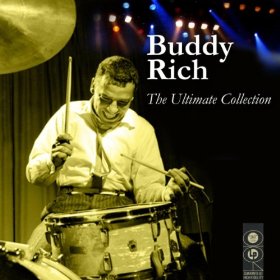![]()
Buddy Rich -
September 30, 1917 – April 2, 1987
- The
- Unofficial
- Buddy Rich Website
-

- Chronology
- Buddy Rich interview
- Buddy Rich/Gene Krupa Interview
- Buddy's Drum Setup
- Article On Buddy
- Buddy Rich Products
- Quotes
- Stories
- Message Board
- Photo Gallery
- Links
- Guestbook
- Home



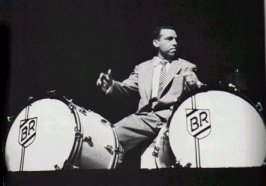
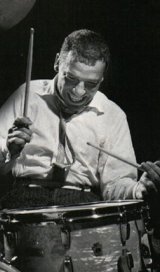
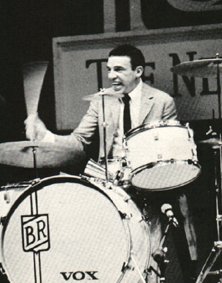

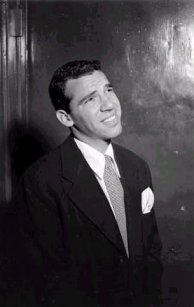
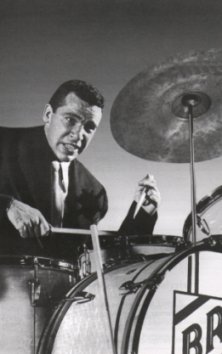


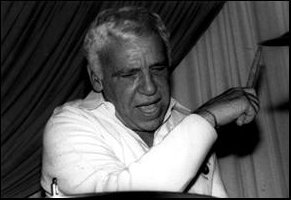
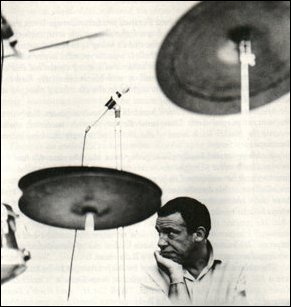
.
![]() Buddy Rich interview
Buddy Rich interview
Interviewer Jim Warchol, Modern Drummer Magazine
 The
club was filled; filled with people of all ages, and lots of young
wide-eyed drummers, there for a glimpse of the living legend called Buddy
Rich. MD met up with Buddy and his youthful band at a club in St. Louis.
Entering informally through the front door, he watched as the road crew
set up; he signed some autographs and shook some hands. His performance,
as usual was flawless. Colossal technique combined with total control and
dynamic propelling drive. His playing, always alive with imagination and
humor, was colored with fiery fills and subtle nuances, never losing his
instinctive sensitivity, good taste, and total musicality. The left hand,
always active, interacting with astonishing bass drum work, always in
motion, swinging and exciting, executing rhythmic figures that leave the
listener wondering if his ears and eyes might be playing tricks on him.
That's impossible; nobody can do that; nobody can do what he does, and
yet, you know he's done it.
The
club was filled; filled with people of all ages, and lots of young
wide-eyed drummers, there for a glimpse of the living legend called Buddy
Rich. MD met up with Buddy and his youthful band at a club in St. Louis.
Entering informally through the front door, he watched as the road crew
set up; he signed some autographs and shook some hands. His performance,
as usual was flawless. Colossal technique combined with total control and
dynamic propelling drive. His playing, always alive with imagination and
humor, was colored with fiery fills and subtle nuances, never losing his
instinctive sensitivity, good taste, and total musicality. The left hand,
always active, interacting with astonishing bass drum work, always in
motion, swinging and exciting, executing rhythmic figures that leave the
listener wondering if his ears and eyes might be playing tricks on him.
That's impossible; nobody can do that; nobody can do what he does, and
yet, you know he's done it.
To say that Buddy Rich is a phenomenon in the world of drumming is an understatement. In terms of total technical mastery of the instrument, it's probably fair to say that no one has yet come any closer. It is doubtful that there has ever been a single musician anywhere who can spark a band the way he does. When it comes to interviewing Buddy, one must learn to expect the un-expected.
You can end up with a first rate story, or no story at all. He's a very intense human being, with beliefs as strong as his hands. He can, at times be curt, intimidating, cutting if necessary especially if he senses any kind of insincerity. At other times, something will hit a soft spot and he is capable of elaborating in the most calm and literate manner. He has some very definite opinions, perhaps controversial. He's outspoken and filled with self confidence.
There is no denying it; Buddy speaks the way he feels, no editing; total honesty at all times. But beneath that tough exterior, one will find a man who's deeply concerned about the state of music and drumming today. He is well aware of what's going on and he's not always thrilled with what he sees and hears. He has little patience with bad musicians and bad music. Aloof? Unfriendly? Not really. The man made time between shows, to sit with members of a young and relatively unknown magazine staff to discuss music, drums, and drumming. Sorry folks, we don't call that aloof or un-friendly.
Relaxed, in his dressing room, MD was greeted by a most cordial and receptive Buddy Rich. We later found a line from a piece on Buddy by big band critic George Simon a few years back. It seemed to capture the essence of the man we found. "To some, he is cocky, sometimes overbearing, at times unnecessarily arrogant. They only have the outward, extroverted exhuberance to go by. Calm Buddy down, show him that he doesn't have to spark every gathering the way he sparks every bunch of playing musicians and you've got one of the warmest, most sensitive gents you've ever met."
MD - Where are you originally from?
BR - Brooklyn.
MD - Is it true that your parents were in vaudeville and that you were a pretty good tap dancer when you were young?
BR - Yes, that's right, I used to be.
MD - What about your formal back-ground, Have you ever taken a lesson or been to a music school?
BR - No, I've never taken a lesson. As far as music school goes. I walked through Berkeley one time to visit with some people I know.
MD - Do you rernember the first set of drums you ever had?
BR - Well, l've seen pictures of one of the first sets of drums I had. When I fjirst started playing. they weren't making turnable tom-torms, they weren't making sets like they do now.
MD - When you were travelling with yonr parents and they sat you in the or orchestra pit, did you always take an interest in drums first?
BR - Yeah.
MD - Did you practice much?
BR - Well, I never really practiced because I never had the opportunity to practice. I've been working all my life ... I've been playing drums all my life, and now, I'm to lazy to bother with it. I have other things that I have to do - practice my martial arts , take care of my cars. I don't put too much emphasis on practice anyhow.
MD - Would you mind elaborating on that a bit.
BR - I think it's a fallacy that the harder you practice the better you get. You only get better by playing. You could sit around in a room, in a base-ment with a set of drums all day long and practice rudiments, and try to develop speed, but until you start playing with a band, you can't learn technique, you can't learn taste, you can't learn how to play with a band and for a band until you actually play. So, practice, particularly after you've attained a job, any kind of job, like playing with a four piece band, that's ...... an opportunity to develop. And practice, besides that, is boring. You know, I know teachers who tell their students to practice four hours a day, eight hours a day. If you can't accomplish what you want in an hour, you 're not gonna get it in four days.
MD - You were good friends with the late Gene Krupa, weren't you?
BR - Yes, he was a very good friend of mine.
MD- Do you consider him an influence?
BR - I consider every drummer that ever played before me an influence, in every way. There were so many individual styles thirty or forty years ago. Every drummer that had a name, had a name because of his individual playing. He didn't sound like anybody else, So everybody that I ever listened to, in some form, influenced my taste.
MD - Was there any one person who really influenced your style? Any certain kind of music?
BR - Yeah, I think probably Goodman, and the Casaloma band were my first two influences in jazz. And, well of course, Count Basie, and I think all of the black bands of the late thirties and early forties, bands with real players. They had an influence on everybody, not just drummers. They had an influence on the entire world of jazz. There were so many creative artists, so totally different from one another.
MD - Did you like the music you were playing with the big bands of thirty years ago better than you do now?
BR - I think I liked everything I ever played. I mean, I think I liked every band I ever played in because each band was different, each band had a different concept, and each band leader was different... different personalities and musical tastes. So, if you don't listen to all that, well then you become stagnant and you stay in one thing. But I've played with so many varied bands with varied musical tastes, that I feel qualified to have my own musical tastes at this point in my life.
MD- Have you ever thought about playing with a symphony orchestra, or playing other percussion instruments?
BR -I've thought about It. It's interesting, but simple. To have everything written for you ... It's not really creating. That's why I think symphony drummers are so limited. They 're limited to exactly what was played a hundred years before them by a thousand other drummers. And, you know, I think the original recording of Ravel's Bolero, probably whoever played percussion on that, will never have It played better than that. So, what do they do? They're simply following what was laid down in front and they play the same thing. So, there's no great challenge In being a classical drummer.
MD - I believe there's a music school in the East where the professors prefer that their students do not know how to read music. Their belief is that students can learn more by playing by ear. What do you think about that?
BR - That's right. But, I think it's very important that you read. I think you should read in order to know what the chart is all about. But, I don't think any arranger should ever write a drum part for a drummer because if a drummer can't create his own Interpretation of the chart and he plays everything that's written, he becomes mechanical; he has no freedom.
MD - A symphony musician once said that all musicians copy, that there are no original musicians because everything that will ever be played has been played before. What do you think about that statement?
BR - I don't think so. Idon's think anybody ever played like Charlie Parker. I don's think anybody ever played like Lester Young. I don't thint anybody ever played like Coleman Hawkins or Dizzy Gillespie or Miles Davis ... or Art Tatum .. - or Charlie Christian. I could go back and name a thousand musicians who were the total creators, and what we're hearing today is an upshoot of what they originated. So, the symphony musician who said that has no idea of what he's talking about. If he's a true symphony artist, he knows better than that because he knows that the only truly creative musician is the jazz musician. Because after he gets done with all the classical stuff he learns In school, he then has to develop into a jazz player and that takes originality, and creativity. So. any symphony musician who would make a statement like that, is in sad neglect of a musical education.
MD - Does your band have a heavy road and club date itinerary these days?
BR - We don't play too many clubs. We play mostly schools. In the summer-time, the schools are closed, so we do more club dates.
MD - Do you pick the personnel in your band?
BR - Yep,everything up there, I pick.
MD - Are you doing any recordings in the near future?
BR - We have a brand new album out now, and well start getting ready to do our next album sometime around the first of the year.
MD - Do you like recording?
BR - No, I don't like recording. It's a bore.
MD - Does it take long for you to record an album?
BR - Not really. It takes us about four or five days to get an album out.
MD - It seems as though you have no set format on the bandstand. You seem to select each chart on the spur of the moment.
BR - That's how we do it. The format is never come on the job knowing what you're gonna do because, then again, it becomes mechanical. You can't play the same thing tonight as you did last night. The reason you have such a large library is so you can change pieces of music. It gives the band a chance to be fresh. It gives your eyes a chance to read something different every night, rather than play the same thing night after night. So, to come In with a set routine it's something I've never believed in. It should depend on how you feel, because you play what you feel.
MD - When you play a solo, is it counted out?
BR - No, I count the band in.
MD - Do you do any limbering up before you perform?
BR - Yeah, I usually take my hands out of my pockets.
MD - Have you ever played with your bare hands?
BR - Yeah, why destroy your hands though? I can think of a lot better things to do with my hands than to cut them up on the rim of a drum.
MD - You're into martial arts. Does this help your playing in any way?
BR - No. I do it for relaxation, recreation, and for the art.
MD - How long have you been practicing martial arts?
BR - About fifteen years.
MD - Are you a black belt?
BR - Yes.
MD - About the thing on "What's My Line", you know, the playing upside-down thing?
BR - That was something that one of their directors thought of doing. I had never done anything like that before. Until you've tried it, I's very difficult to explain. You're playing against gravity and... it was a real challenge, it was interesting. I didn! know what to expect because I had never done that kind of thing before.
MD - What do you think of drummers who use theatrics of that sort regularly?
BR - I think they 're full of shit.
MD - Hiding their abilities, or their non-abilities so to speak?
BR - Well, I think its a matter of making a statement that you're saying In essence, "I can't play, so look at all the gimmicks". I've never known a player, whether it's in sports... whatever, if you can do something without any fanfare, you can do. it. But, when you have to resort to turntables, trick lights, flashing lights, fire and all that, you're actually saying, I need this because what I do is not all that together.
MD - That little trick of using both ends of one stick to play two different drums. Is that something you thought up?
BR - Almost everything I've done, I've done through my own creativity. I don't think I ever had to listen to anyone else to learn how to play drums. I wish I could say that for about ten thousand other drummers.
MD - Your set-up is simple and basic. Have you ever used more drums?
BR - The difference between a lot of drums as opposed to a few drums is just the amount of drums. You could have five sets of drums up there, what does that mean? If you have two bass drums, six tom-toms, twelve cymbals -what does that mean? You only use the basic four cymbals, a bass drum, a snare drum, a pair of hi-hats, and a couple of tom-toms. Any more than that is superfluous. They're not really basic drums, but a perfect set of drums.
MD- What are your feelings on drums and amplification and electronic effects?
BR - I play a percussion instrument, not a musical saw; it needs no amplification. Where it's needed, they put a microphone in front of the bass drum. But, I don't think it's necessary to play that way every night.
MD - What do you think of some of the new, young, up and coming drummers?
BR - I think some of them are very good.
MD - Do you have any preferences?
BR - I like Bobby Columby, I like the kid with Chicago... Seraphine, Danny Seraphine. There's a bunch of good ones. What's that kid's name from New York...Steve............. Steve Gadd. There are about eight or ten drummers that I think have good taste, good application with their hands. All the other drummers try to cop what they do, which isn's really that hard to cop. But for what they play, they play it very well
MD - We noticed you looking at a Roto-Tom before the show. What do you think of that kind of thing?
BR - I imagine that anybody who wants to strive for something different, who's looking to latch on to some "trick" ... well - -- but after they get through with the trick, they get back to playing basic drums. So why go through all that other bullshit to get to what you're gonna do anyhow? Why not get to it?
MD - Did you ever try single-headed tom-toms?
BR - No, I've never tried that because I think that's really nuts. What's the point. When you buy a set of drums, you buy them for the sound and the resonance, and you destroy the tone by taking the bottom heads off. What's the purpose in that? And then you stuff a blanket in the bass drum so you can 't hear it anyhow.
MD - Don't you use' any type of internal mufflers on your drums?
BR - I use a strip of felt across the bass drum, about two inches wide. That's it.
MD - How about drum heads?
BR - I use Weather-King Plastic heads.
MD - Do you prefer a certain weight drum stick?
BR - I use a medium weight stick that's comfortable in my hands.
MD - What do you think about the matched grip?
BR - I use it sometimes, when I play a rock-shot.
MD - Do you find it more comfortable?
BR - It's of no dimension at all to me. It's just something I do, sometimes.
MD - For years, you've set your crash cymbals flat, without any angling. Do you get a better sound that way?
BR - No, that's the way your hand moves. The downward stroke is the normal stroke.
MD - What can you tell us about tuning drums?
BR - I don't tune them, I tension them. There's a great difference. If you tune a drum, that means you're looking for a note. If you try to tune to any given note, as soon as the audience comes in, or the weather changes, or it gets hotter or colder or damp, the heads go down. They can't be tuned. You can only tension them.
MD - Are any of your drums specially made?
BR - Nope; right off the rack.
MD - That's interesting. I thought many name players used custom made equipment?
BR - Yeah, well that's because they can't play. I mean It's obvious you know ... you put a race driver in a car, if he knows how to drive, he can drive anything. If he can't drive, he can't push a kiddie car.
MD - Do you have several sets of drums?
BR - I can get a set whenever I want. If I need another set of drums, I call the factory and they send a set right out.
MD - Just how particular are you about your drums?
BR - Well, they have to be set up exactly the same every night, and I don't let anybody touch my drums. Nobody. And, when I finally do condescend to let someone use my drums, they have strict rules and regulations when they get behind them. Not one thing is to be disturbed. You can play on them the way I leave them. I don't allow a cymbal to be turned. Nothing.
MD - What advice do you have for young drummers?
BR - None. I don't give advice to anybody. Everybody has to make their own decisions and everybody should make their own decisions.
MD - Do you think it's harder for the young drummer today to make it to the top than it was when you started?
BR - Well, I think it's a lot easier. In those days you had to be able to play. It's easier now because the kids that are playing today have no musical background. They luck out with an album and they become stars. I mean, where is their staying power? Where is their creativity? Most drummers I hear today play what every other drummer has played on record. I don't hear one bit of originality. I hear triplets coming off tom-toms by every kid that's been able to hold a pair of sticks. That's not my idea of playing drums.
MD - What do you see, in the future of drums?
BR - Somebody asked me that question about thirty years ago, and siting here being asked the same question thirty years later, I'll have to give you the same answer. The people who play, will continue to play, and the people who steal and copy will continue to be bad imitations and thieves. So, it's up to the young people who are totally creative in the instrument, to ever progress any place. But, I don't see that happening.
![]()
Copyright © 1999 - 2012 The Unofficial Buddy Rich Website
